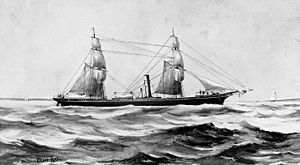CSS Georgia (1862) facts for kids

CSS Georgia
|
|
Quick facts for kids History |
|
|---|---|
| Name | Japan |
| Launched | 1862 |
| Fate | Sold to Confederate States Navy March 1863 |
| Name | Japan |
| Acquired | March 1863 |
| Commissioned | 9 April 1863 |
| Renamed | CSS Georgia 9 April 1863 |
| Captured | By USS Niagara, 15 August 1864 |
| Fate | Sold |
| Name | Georgia |
| In service | 5 August 1865 |
| Fate | Re-registered in Canada 1870 |
| Name | Georgia |
| Operator | Quebec and Gulf Ports Company |
| In service | 1870 |
| Fate | Wrecked 14 January 1875 |
| General characteristics (as Confederate States Navy steamer) |
|
| Type | Screw steamer |
| Displacement | 600 tons |
| Length | 212 ft (65 m) |
| Beam | 27 ft (8.2 m) |
| Depth of hold | 13 ft 9 in (4.19 m) |
| Propulsion | Steam engine and sails |
| Armament |
|
CSS Georgia was a special type of ship called a screw steamer that served in the Confederate States Navy during the American Civil War. It was bought in 1863 and later captured by the Union Navy in 1864. This ship was known for sailing around the world to attack Union merchant ships.
Contents
Building the Georgia
The ship was first built in 1862 in the United Kingdom. It was meant to be a fast merchant ship and was originally named Japan. It had an iron frame, which was a new way to build ships back then. However, iron hulls could get dirty and rusty easily, especially on long trips, because special paints to protect them didn't exist yet.
A Confederate agent named James Dunwoody Bulloch usually preferred wooden ships because they could be covered with copper to prevent rust. But it was hard to find new wooden ships in Britain at the time. So, another agent, Matthew Fontaine Maury, decided to buy the Japan even though it had an iron hull.
Georgia's Time at Sea
Serving the Confederacy
The Confederate government bought the Japan in Scotland in March 1863. On April 1, 1863, it left Greenock, Scotland. The crew thought they were sailing to the East Indies.
But off the coast of Ushant, France, the ship met another steamer called Alar. The Japan took on cannons, ammunition, and other supplies from the Alar. On April 9, 1863, the Confederate flag was raised. The ship was officially named CSS Georgia and was ready for duty. Its commander, William Lewis Maury, was ordered to attack any United States merchant ships they found.
The Georgia sailed to many places around the world. It stopped in Bahia, Brazil, and Trinidad. Then it crossed the Atlantic Ocean again to Simon's Bay in Cape Colony, Africa, arriving on August 16, 1863. From there, it went to Santa Cruz in the Canary Islands, and then to Cherbourg, France, arriving on October 28, 1863. During this journey, the Georgia captured nine enemy ships.
While the Georgia was being repaired in Cherbourg in early 1864, there was a plan to move its cannons to another Confederate ship, the CSS Rappahannock. But this never happened. The Georgia was then moved to an anchorage near Bordeaux, France.
On May 2, 1864, the ship was taken to Liverpool, England. It was sold on June 1, 1864, to a merchant there. The United States Minister to Great Britain, Charles Francis Adams, Sr., protested this sale, but it went through.
The steamer sailed again on August 11, 1864. Just a few days later, on August 15, 1864, the United States Navy frigate USS Niagara captured the Georgia off the coast of Portugal. The captured ship was sent to Boston, Massachusetts. There, it was declared a legal prize of war and sold by the United States government.
Life as a Merchant Ship
After being sold, the ship was registered as a U.S. merchant ship named SS Georgia. This happened in New Bedford, Massachusetts, on August 5, 1865.
In 1870, the ship was re-registered in Canada. It was owned by the Quebec and Gulf Ports Company and still named SS Georgia. On January 14, 1875, while traveling from Halifax, Nova Scotia, to Portland, Maine, the ship was caught in a snowstorm at night. It hit a reef called the Northern Triangles in Penobscot Bay off the coast of Maine and was wrecked. Luckily, no one on board lost their life.
See also
 In Spanish: CSS Georgia (1862) para niños
In Spanish: CSS Georgia (1862) para niños
 | Georgia Louise Harris Brown |
 | Julian Abele |
 | Norma Merrick Sklarek |
 | William Sidney Pittman |

